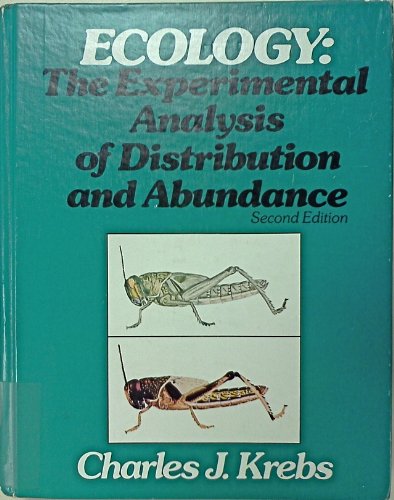
Synopsis
This best-selling majors-level book, by Charles Krebs, approaches ecology as a series of problems, which are best understood by evaluating empirical evidence through data analysis and application of quantitative reasoning. No otherbook presents analytical, quantitative, and statistical ecological information in an equally accessible style for students. Reflecting the way ecologists actually practice, the new edition emphasizes the role of experiments in testing ecological ideas and discusses many contemporary and controversial problems related to distribution and abundance. Introduction to the Science of Ecology, Evolution and Ecology, Behavioral Ecology, Analyzing Geographic Distributions,Factors That Limit Distributions Biotic, Factors That Limit Distributions Abiotic, Distribution and Abundance, Population Parameters and Demographic Techniques, Population Growth, Species Interactions Competition, Species Interactions Predation, Species Interactions Herbivory and Mutualism, Species Interactions Disease and Parasitism, Regulation of Population Size, Applied Problems Harvesting Populations, Applied Problems Pest Control, Applied Problems Conservation Biology, Community Structure, Community Dynamics Biodiversity, Community Dynamics Predation and Competition, Community Dynamics Nonequilibrium Communities, Ecosystem Metabolism Primary Production, Ecosystem Metabolism Secondary Production, Ecosystem Metabolism Nutrient Cycles, Ecosystem Dynamics under Changing Climates, Ecosystem Human Impacts. Intended for those interested in learning the basics of ecology
"synopsis" may belong to another edition of this title.
From the Back Cover
This best-selling ecology book continues to present ecology as a series of problems for readers to critically analyze. No other book presents analytical, quantitative, and statistical ecological information in an equally accessible style. Reflecting the way ecologists actually practice, the book emphasizes the role of experiments in testing ecological ideas and discusses many contemporary and controversial problems related to distribution and abundance. Throughout the book, Krebs thoroughly explains the application of mathematical concepts in ecology while reinforcing these concepts with research references, examples, and interesting end-of-chapter review questions. Thoroughly updated, the book includes new chapters on disease ecology (15) and the human impact on ecosystem health (28). Chapters on conservation biology, community organization, and primary production are extensively revised, and coverage of evolutionary and functional biology is more integrated. Thirty-four new essays provide interesting insights into relevant topics, exploring some of the problems ecologists deal with in their attempt to understand nature.
About the Author
Charles Krebs is Professor of Zoology at the University of British Columbia in Vancouver and has been teaching for 40 years. He received his B.S. from the University of Minnesota and earned both his M.A. and Ph.D. from the University of British Columbia. In addition to teaching ecology, he has worked extensively on the population of rodents in Northern Canada, the United States, and Australia, trying to understand the mechanisms behind population fluctuations. He has published three ecology textbooks including Ecology: The Experimental Analysis of Distribution and Abundance, Fifth Edition and Ecological Methodology, Second Edition both published by Benjamin Cummings.
"About this title" may belong to another edition of this title.
Other Popular Editions of the Same Title
Search results for Ecology: The experimental analysis of distribution...
Ecology: The experimental analysis of distribution and abundance
Seller: -OnTimeBooks-, Phoenix, AZ, U.S.A.
Condition: very_good. Gently read. May have name of previous ownership, or ex-library edition. Binding tight; spine straight and smooth, with no creasing; covers clean and crisp. Minimal signs of handling or shelving. 100% GUARANTEE! Shipped with delivery confirmation, if you're not satisfied with purchase please return item for full refund. Ships USPS Media Mail. Seller Inventory # OTV.0060437715.VG
Ecology : The Experimental Analysis of Distribution and Abundance
Seller: Better World Books, Mishawaka, IN, U.S.A.
Condition: Good. 2nd. Used book that is in clean, average condition without any missing pages. Seller Inventory # 3075901-6
Ecology: The experimental analysis of distribution and abundance
Seller: -OnTimeBooks-, Phoenix, AZ, U.S.A.
Condition: good. A copy that has been read, remains in good condition. All pages are intact, and the cover is intact. The spine and cover show signs of wear. Pages can include notes and highlighting and show signs of wear, and the copy can include "From the library of" labels or previous owner inscriptions. 100% GUARANTEE! Shipped with delivery confirmation, if you're not satisfied with purchase please return item for full refund. Ships via media mail. Seller Inventory # OTV.0060437715.G
Ecology: The Experimental Analysis of Distribution and Abundance
Seller: Anybook.com, Lincoln, United Kingdom
Condition: Poor. This is an ex-library book and may have the usual library/used-book markings inside.This book has hardback covers. Book contains pen markings In poor condition, suitable as a reading copy. Re-bound by library. Please note the Image in this listing is a stock photo and may not match the covers of the actual item,1300grams, ISBN:0060437715. Seller Inventory # 9316928
Buy Used
Quantity: 1 available
Ecology: The Experimental Analysis of Distribution and Abundance
Seller: WeBuyBooks, Rossendale, LANCS, United Kingdom
Condition: Good. Most items will be dispatched the same or the next working day. A copy that has been read but remains in clean condition. All of the pages are intact and the cover is intact and the spine may show signs of wear. The book may have minor markings which are not specifically mentioned. Seller Inventory # wbs7399048741
Buy Used
Quantity: 1 available
Ecology: The Experimental Analysis of Distribution and Abundance. Second Edition.
Seller: Plurabelle Books Ltd, Cambridge, United Kingdom
Paperback. Condition: Very Good. xxv 678p large paperback textbook, tan brown cover, firm binding with lightly sunned spine, slight wear to cover edge, one name to endpaper, pages otherwise free from marks and annotations, clear diagrams and graphs throughout, very good little-used copy Language: English Weight (g): 1247. Seller Inventory # 239347
Buy Used
Quantity: 1 available
Ecology - The Experimental Analysis of Distribution and Abundance
Seller: Laura Books, Georgetown, SA, Australia
Soft Cover. Condition: Good. No Jacket. 2nd Edition. slight wear to covers and cover edges, owners markings endpapers, otherwise book clean and tight. Due to weight extra may apply to any quoted international postage Size: 4to - over 9¾" - 12" tall. Seller Inventory # 025905

